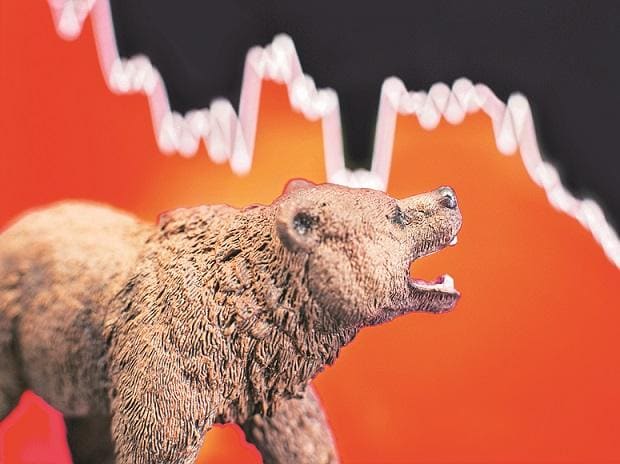
Markets ended 2.5% lower on Thursday, breaking a 10-day rally, with the S&P BSE Sensex falling 1,066 points to end the day at 39,728 levels. On the other hand, the Nifty50 index lost 291 points to settle at 11,680 levels. Also, the weakness of global markets due to renewed restrictions in European countries to curb the possible second wave of coronavirus (Covid-19) turned Dalal Street into a red sea.
In intraday trading, the benchmark S&P BSE Sensex index fell 1,127 points, or 2.7 percent, to 39,684 levels. The broader Nifty50 had slumped 310 points or 2.5 percent to hit a low of 11,661 levels before recovering somewhat.
“Indian markets opened marginally negative following negative signals in Asian markets, as global markets were uncommitted amid stimulus concerns. Selling intensified during the day and was mainly driven by negative news coming in. of European markets. Increased incidence of Covid-19 cases have led to a new round of lockdowns being implemented in some cities in Europe. Traders appeared to take note of the increase in Covid-19 cases and booked profits out of fear to the possible dent in the economic recovery as a result of the re-imposition of the lockdown in the world’s major cities, “said Narendra Solanki, head of fundamental stocks research at Anand Rathi Shares & Stock Brokers.
These are the main triggers for today’s correction:
American stimulusWall Street ended weaker on Wednesday as investors gave up hope that a US fiscal stimulus would pass before the November presidential election. Pessimistic comments from Treasury Secretary Steven Mnuchin that a deal would likely not be reached before the vote added uncertainty to markets. The development had triggered a negative reaction in Indian markets when they opened for trade on Thursday.
“At this point, it would be difficult to do something before the elections and execute it, just considering where we are and the level of detail, but we will try to continue working on these issues,” Mnuchin said at an event. on Wednesday.
During Wednesday night’s trading session, the Dow Jones fell 0.58%, the S&P 500 lost 0.66% and the Nasdaq Composite fell 0.80%. Meanwhile, Dow Jones futures were down 257 points at 2:50 pm Thursday, signaling an extension of losses on Wall Street.
Covid-19 restrictions in EuropeEuropean leaders rushed to contain the second wave of coronavirus in the region, imposing radical restrictions and closures. On Wednesday, French President Emmanuel Macron declared a state of public health emergency and said nine of the country’s largest cities, including Paris, will have to comply with a 9 p.m. to 6 a.m. curfew, starting Saturday for four weeks. Additionally, German Chancellor Angela Markel has given states the freedom to decide their own strategy to curb the increase in cases.
Shares in Europe fell for the third straight session in early trading. The pan-European STOXX 600 was down 1.7 percent to a nearly two-week low, with the London and Paris markets down 1.4 percent-1.7 percent and Frankfurt and Milan down 2 percent. 2.5 percent weaker.
Asian markets sell off: Asia-Pacific investors pressed the panic liquidation button as the acceleration of Covid-19 cases in the US and the EU, in the absence of any vaccine, and the delay in the US stimulus package Hopes of recovery lowered. Japan’s Nikkei closed half a percent lower, while the Asia Dow fell 1.6 percent. Hong Kong’s Hang Seng, meanwhile, sank just over 2 percent.
Weak Indian fiscal position: Credit rating agency Moody’s Investors Service said on Thursday that India’s fiscal position “remains very weak.” The latest government fiscal measures, he said, will have minimal impact on the country’s growth prospects and that the government’s’ small-scale ‘package is actually a negative credit as it reflects the country’s’ limited budget power to support the economy’. READ MORE
Moody’s expects India’s GDP to fall 11.5 percent in 2020-21, so the government’s expected 0.5 percent increase in GDP from these stimulus measures will provide only “a small boost”, he pointed.
Profit reserve: Investors made a profit on a 10-day rally in the benchmarks through Wednesday. In the past ten trading sessions, the benchmark indices Sensex and Nifty have risen 7 percent each, data from ACE Equity shows. By sector, the Nifty IT index fell almost 4% in intraday trading. The BSE IT index fell 5 percent from its record high of 22,808 touched early today. So far in financial year 2020-21, the TI index has outperformed the market with a 74% increase, compared to a 38% increase in the S&P BSE Sensex during this period. READ MORE
.